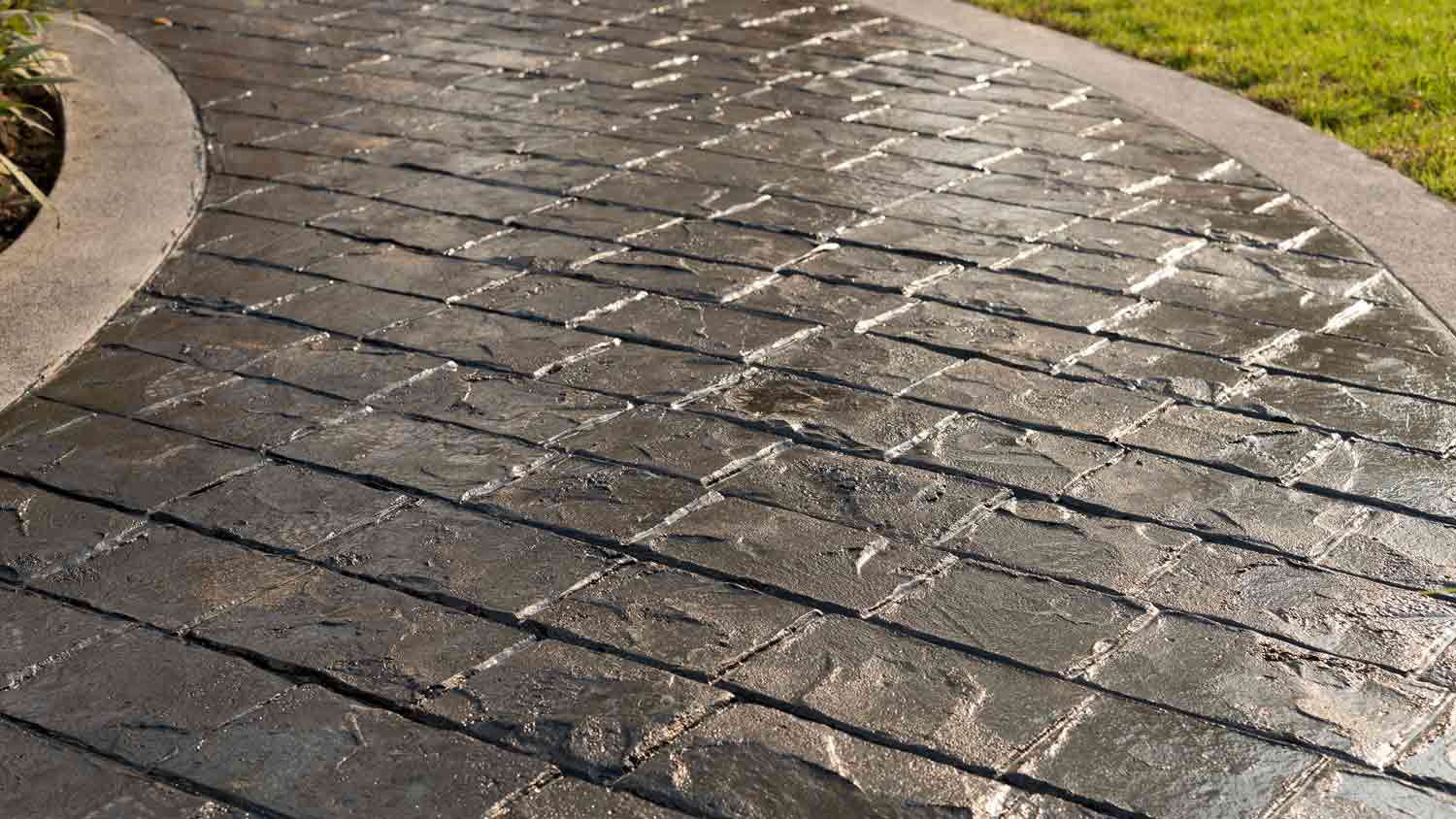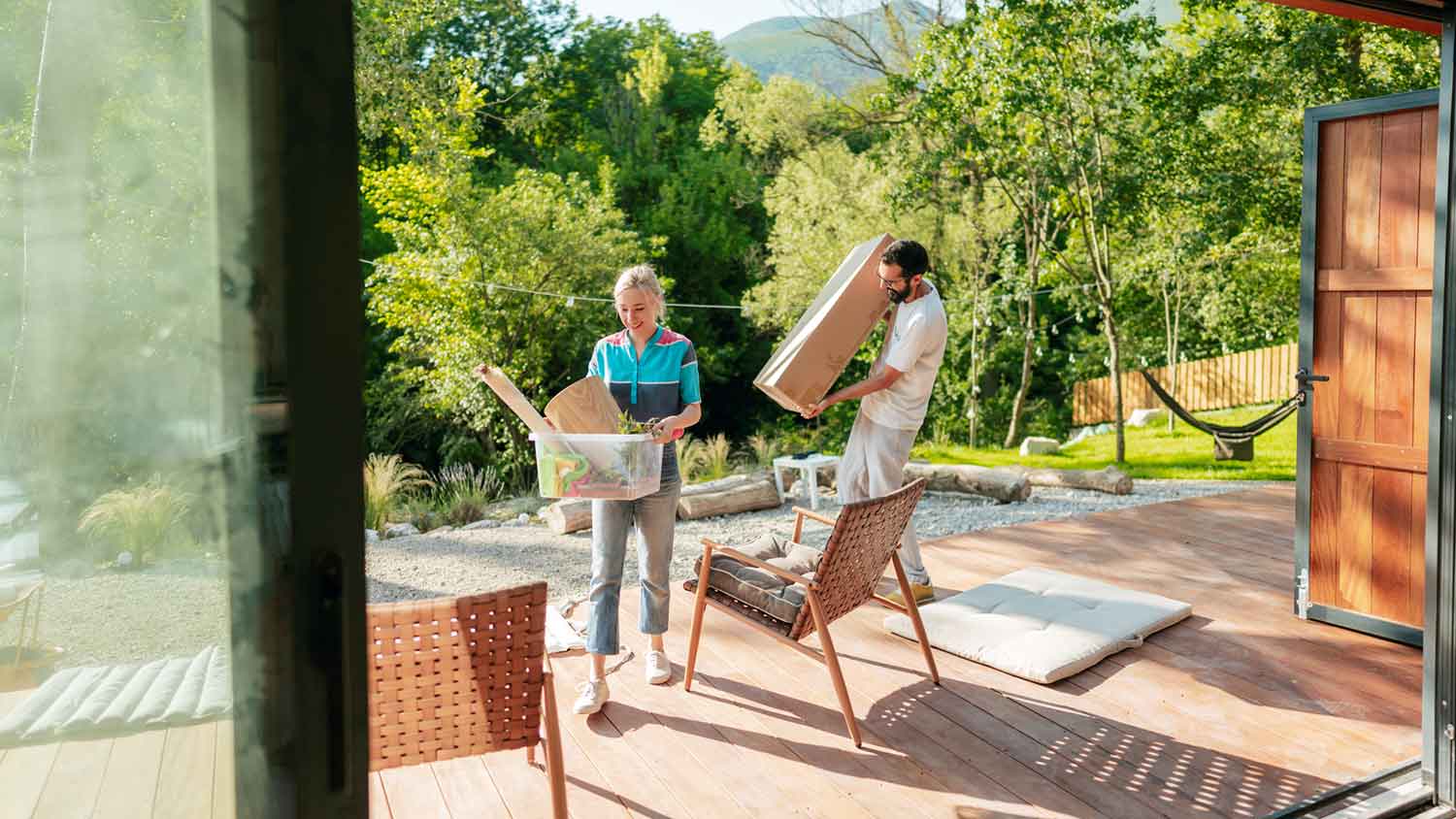
A deck skirt can improve the form and function of a deck. Find out what it could cost to install deck skirting in your backyard with this guide.
Seal in your concrete’s appearance and extend its lifespan


Sealing a concrete patio improves its durability and appearance.
Concrete needs to be resealed every few years to protect it from water damage, cracking, and staining.
Don’t seal concrete until it has cured for at least one month, and wait for the right weather conditions.
Concrete sealing costs $1.35 to $2.50 per square foot.
Concrete patios are durable, economical, and versatile. Sealing your patio can give you peace of mind, knowing the concrete is protected from water damage, cracking, and staining. But the expense isn’t worth it for everyone. It pays to do your research, so here are a few reasons why you’d want to seal your concrete patio.

Sealing a concrete patio can significantly increase its lifespan, ensuring it remains in optimal condition for years to come. The benefits are even more pronounced in areas with frequent rainfall or snow storms. Here are the primary advantages of sealing a concrete patio.
Thanks to its porous nature, mold and mildew can grow inside moist concrete, giving it an unsightly, spotty appearance that may need to be bleached or pressure-washed away. Sealing can block moisture from penetrating the slab, keeping mold or mildew at bay.
Concrete expands when exposed to moisture, and when wet concrete withstands freezing temperatures, it can expand even more. The pressure from this expansion can cause the material to crack and crumble. Sealing concrete waterproofs the surface, preventing moisture from penetrating the material. Eliminating water penetration will dramatically reduce the risk of weather-related cracking and extend the material’s lifespan.
Spilled drinks, pooling water, cleaning chemicals, and more can stain or bleach your concrete patio, giving it a blotchy, discolored appearance. Sealing makes it harder for spills to seep in.
The slick surface of sealed concrete is a breeze to spray or sweep clean compared to the porous surface of unsealed concrete. Plus, dirt and debris won’t stick to the surface as easily, so you won't have to clean as often.
There are many sealants out there. Concrete sealant finishes for patios range from flat to high-gloss sheen, and while they can be clear, some will also darken or enhance the color of the concrete. Regardless of the type of sealant you choose, it can also help prevent your color from fading. If you invested in colored concrete, sealant is a great way to keep it looking its best for longer.
Sealing concrete may not be feasible in certain circumstances and may not be desirable in others. Here are some situations where you may want to avoid sealing your patio:
The concrete was just poured: Before applying sealant, the concrete must be allowed to cure for at least a month.
The weather isn’t right: Only apply sealant when the weather will remain dry and above 50 degrees Fahrenheit for at least three days.
You don’t want to commit to the maintenance: Sealant needs to be reapplied every few years to maintain its protection and appearance, so don’t start sealing if you don’t intend to keep it up.
Your concrete already is cracked: Sealing won’t repair existing cracks; for best results, repair or replace your concrete patio first.
You’re concerned about slip hazards. Sealed concrete can be slippery if abrasives are not added to the mix, which could present a problem if the patio is near a pool, you have young children, or anyone in your home has mobility issues.
You live somewhere with frequent earthquakes: While sealing can help prevent cracking due to weather changes, it can’t protect the concrete from cracking when the ground shifts.
While the overall cost of concrete sealing depends on the size of your patio, you can expect to pay an average of $1,500 for a 1,000-square-foot area or $1.35 to $2.50 per square foot. You can hire someone who installs concrete patios, or you may be able to find a deck repair specialist to handle this job
If you intend to seal the surface yourself, you can save a lot of money, as the materials only cost around $0.10 to $0.75 per square foot. While the process may not be particularly complicated, it can be physically taxing, and the sealant fumes may be toxic. Only attempt this project if you feel comfortable with the labor and hazards—otherwise, hire a professional.
From average costs to expert advice, get all the answers you need to get your job done.

A deck skirt can improve the form and function of a deck. Find out what it could cost to install deck skirting in your backyard with this guide.

Thinking of adding a pergola to your backyard space? Find out motorized pergola costs by size, material, and add-on features with this guide.

Learn the cost of a metal awning for your home. Discover the essentials of installation, materials, and labor, and explore ways to save on your project.

Learn how to winterize a patio to protect your outdoor space from cold temperatures and prep for the start of spring.

Poor fitting, age, and damage can make your deck lopsided. Learn what causes unwanted unevenness and how to level a deck with these steps.

Concrete is ideal for an outdoor patio, walkway, or steps. Here are the questions to ask a contractor about your next concrete installation project.